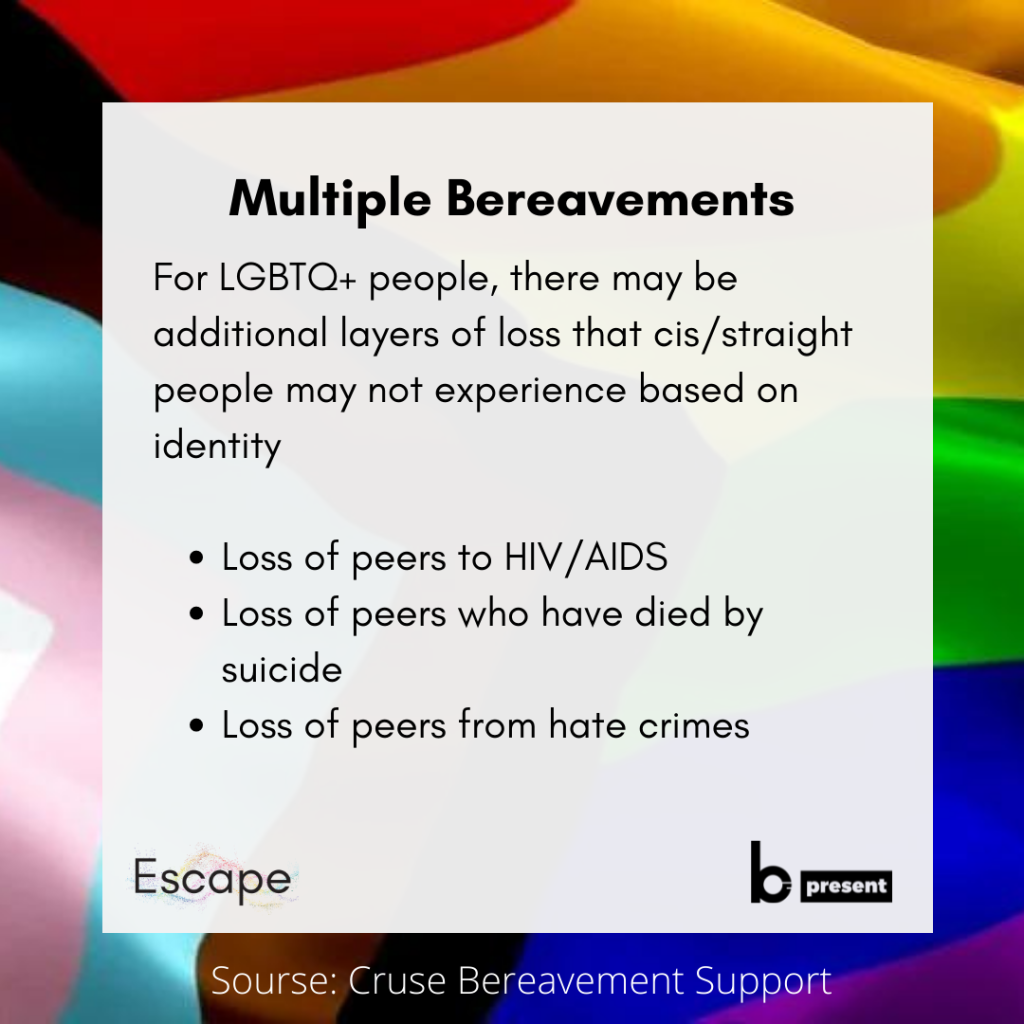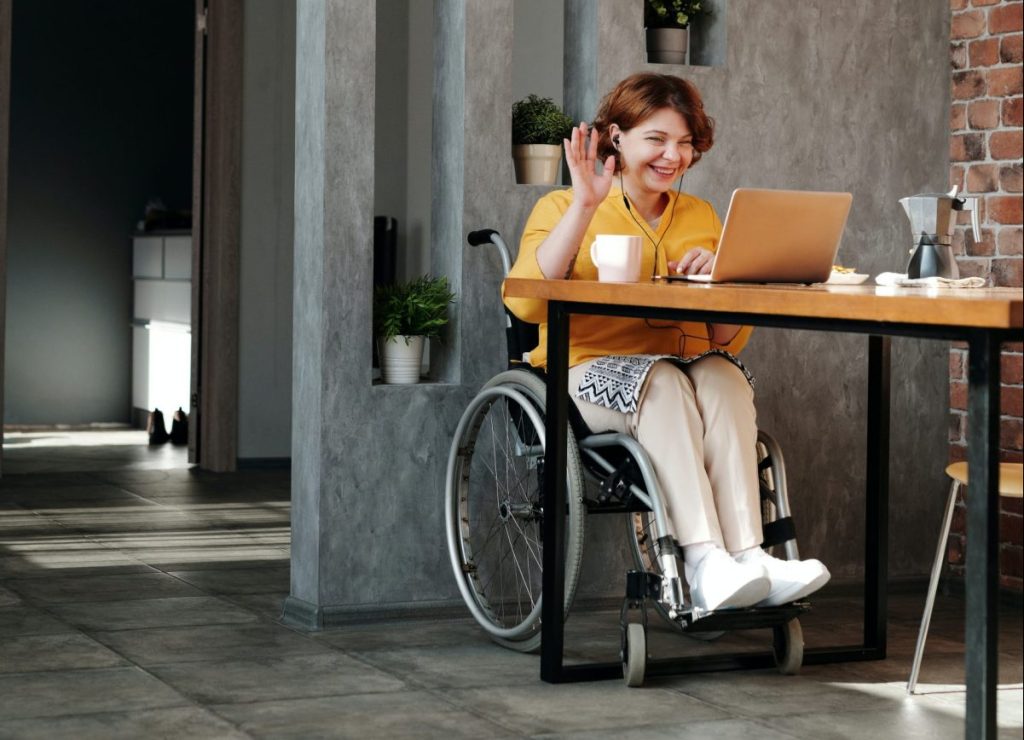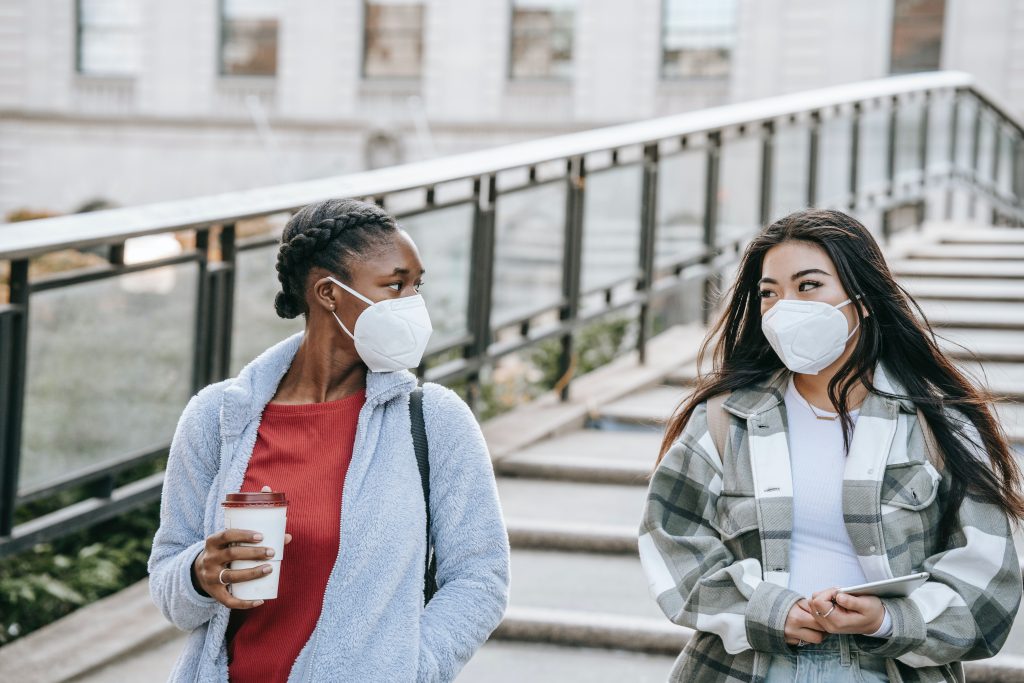Did you know that over 80% of the nearly 1.33 million active duty military personnel are young adults between 18-35? Imagine getting a cancer diagnosis while you are serving your country. Social support for this unique community can often be hard to find. Rebecca Satterwhite, a member of the U.S. Navy, received a devastating breast cancer diagnosis at 26. Due to her own experience with inadequate support throughout treatment and beyond, she is on a mission to make a change and amplify support for military members whose lives have been touched by cancer. Here’s her story…
Tell us about yourself, pre and post-diagnosis?
Before I was diagnosed, I felt smart. I was the strongest I’d ever felt and the fastest because of the training I was in, I put up with a lot more BS, work was my number one priority, I felt like I had a lot of good friends and awesome people that I worked with. After I was diagnosed, I wouldn’t say my main goals changed that much, maybe just my timing.
I always wanted to retire from the military, and I still do, but I’m more focused on switching career fields sooner than I had previously planned. My job right now is pretty cool because of where I work, but I don’t want to work on electronics forever, and after chemo, I feel like I lost a lot of my knowledge on the subject.
The main life change I was not expecting was meeting my husband. We met right before I started chemo, and lucky for me, he didn’t let any of the medical stuff phase him one bit. The second time we really got to hang out was right after I lost my hair, and I was so nervous for him to see me. I had built up this whole situation in my head, and all that went away when he saw me, smiled, and kissed the top of my baby-smooth head. That was the start of a new mindset on my part; I was spending a little too much time worrying about work, and I needed to spend more time on what and who makes me happy.
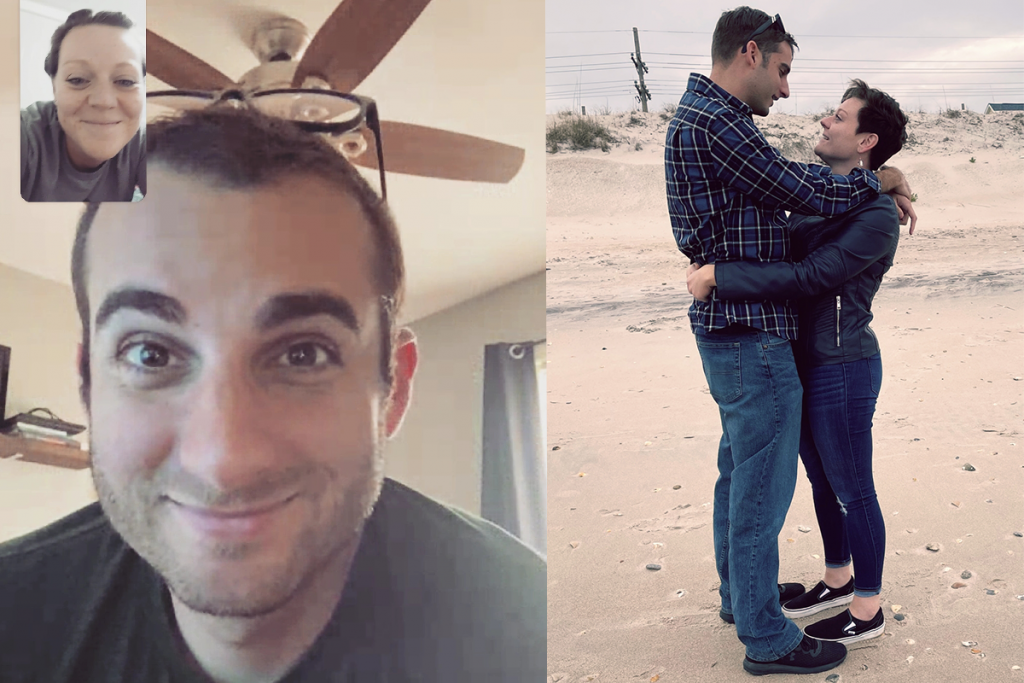
Post-diagnosis and post-treatment, I really started to realize I had to get used to what everyone calls their “new normal,” which is always rough. I’m not going to lie, I’m still fighting that internal battle that I’ll never be exactly who I was before, and it’s hard. I’m still as smart as I was before, but now it takes me a lot more time than I’d like to be able to think of the right word or remember where I put something earlier.
I’m not as physically strong as before, and it sucks starting over; I have pain in weird spots, and parts of my body feel numb, which is strange. I might get as strong and as fast as I once was, but it will take more time and more effort.
Tell us about your cancer experience?
Right in the middle of a pretty tough military training school, I found a lump in my left breast. I immediately thought it was cancer. Most of my family members that were over the age of 40 have had some type of cancer, so I guess I always thought it would happen to me someday too. I just didn’t expect it to be at age 26.
I found out later on that it wasn’t genetic at all and that it had probably been growing for a little over three years. After that, I always wondered if it was job-related, and honestly, I may never find out. I’m active duty in the Navy, and I work on communications equipment, which means when I worked on an aircraft carrier, I was constantly working and living around RF radiation among all sorts of other chemicals for roughly five years.

Once I was diagnosed, I was told my best option was to have a lumpectomy with sentinel node biopsy and radiation therapy following the surgery. The first surgery went well, but more information came from the biopsy. I was told the cancer had started to spread, and I would need another surgery followed by chemotherapy before I ended the treatments with radiation.
Up until this point, I had, of course, been upset that I had cancer, but I always felt that I would be alright once I got through all of the treatments. But after finding out that I would be getting 12 rounds of chemo, I started to feel crushed. I wasn’t ready to feel sick all of the time or tired or lose my hair or any of the number of things I felt once I actually started.
I had no idea what to expect or how I’d feel, and that was scary. I googled a lot, which was not the right answer, but I like to try and feel as prepared as possible. I was not prepared, though.
In my first chemo session, I packed some books, a blanket, snacks, and my laptop. My mom came with me, and I think she was more nervous than I was, but of course, she was trying to look fine. I was glad she was there, but I also didn’t want to look worried. For whatever reason, I felt like I needed to be the strong one.
Sitting in the hospital getting pumped full of meds and chemicals, I was actually not as sick or tired as I expected, but once I got back home, I felt like all I wanted to do was lay in bed. I went from feeling like a pretty healthy and fit 26-year-old to feeling tired constantly and having bone pain that made me shuffle instead of walk normally. After a while, I got used to how it would feel, only to have them start me on a new kind of chemo that comes with different side effects.
Still, I knew it would end eventually, and I would get back to normal life! That definitely was not the case. I did finish treatment and was told I was cancer-free, and I’d be taking one pill (tamoxifen) a day for the next ten years to try and keep me cancer-free, which is fine. I can deal with a pill a day, as long as I’m back to normal, right?
I never got my “before normal” back, which for me was actually one of the hardest things about my cancer experience. I had gone into all this thinking that it would end; if I just get through this part, I’ll be back to how I was before.
At home, I’m usually pretty comfortable with my “new normal.” I have a routine, my family is there, my dogs are there, I’m in my own space, and if I forget something, my husband knows where it’s at or knows the word in the sentence that I can’t think of and helps me out. I have my moments where I get upset or a little mopey at home, but for the most part, I’ve become happy, even a little more confident at home than I was before.
Once I get to work, though, I usually struggle a little more. I’m lucky enough to work with some of the military’s smartest, fittest, and dedicated people. I used to be one of them; I could tackle tons of problems and fix things, keep up with most of them during workouts, and I felt accepted. Now I almost avoid those situations entirely, and I feel like my once good friends avoid me too. Most of the people that know what I went through don’t talk to me much anymore unless it’s specifically work-related, and those that don’t know what I went through give me a puzzled look when I pause in the middle of a sentence or tell me I shouldn’t have my hair that short because it’s not in “navy regs.”
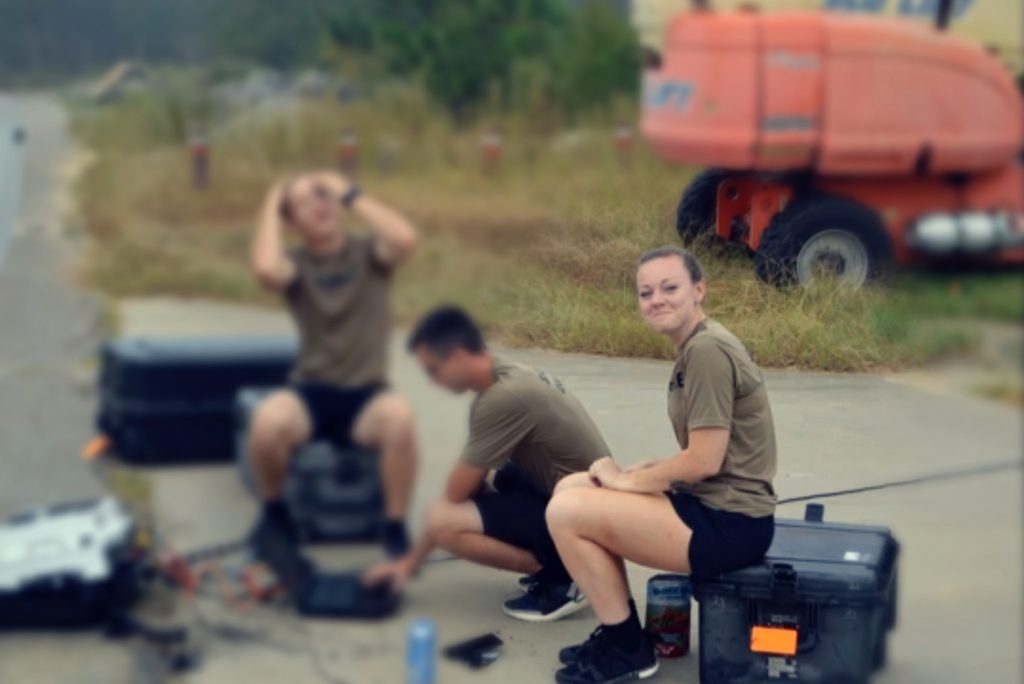
On one hand, I completely understand why they say or look at me funny. Before I went through this, I probably would’ve done the same things. Now I either politely try to explain myself or just get angry in silence and keep it all bottled up. There are understanding and helpful people, but most don’t know how to help, and I feel like a lot of people are surprised that I still have issues a year after my treatments ended. It seems like many people, military or not, think once treatment is done, you should be functioning as you were before.
What never failed to make your day during treatment?
Three days after my first surgery, I ended up adopting my sweet pup, Cypress. I lived alone at the time, so it was wonderful to have him around. He was from a rescue, a little over a year old, and I remember right after my mom dropped me off at home following my first chemo session, he knew something was wrong. Throughout all my treatments, he was so calm and patient with me when normally he would be jumping and running all over the place, being a normal, energetic German Shepherd/Husky mix. He followed me around and would lay his big ol’ head on my lap to keep me company. Aren’t animals just amazing?
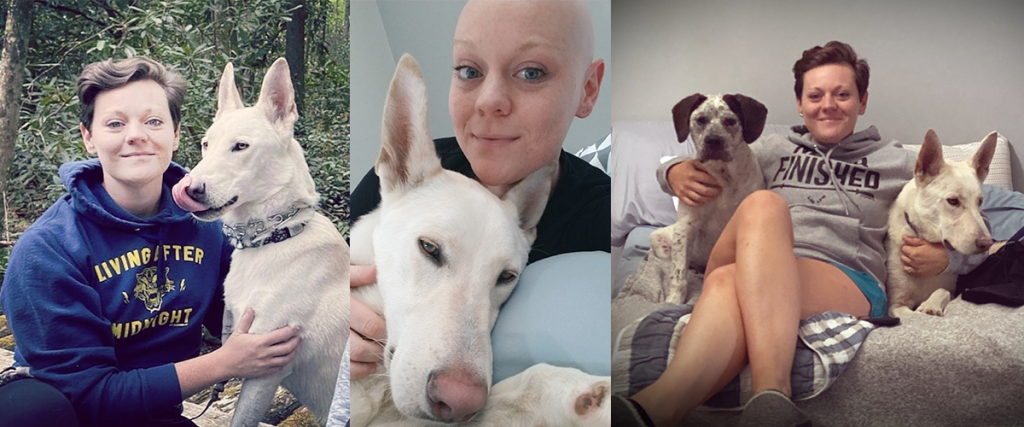
If you could tell new supporters one thing not to do, what would it be?
Don’t talk to them any differently than you would have before, and definitely don’t completely avoid them. If you don’t know what to say, just let them lead the conversation or bring up something you can enjoy talking about that has nothing to do with the cancer subject.
If you could tell new supporters one thing to do, what would it be?
Offering help is great, in my opinion. It doesn’t have to be something huge, maybe just a ride to the hospital if you know they don’t feel well enough to drive themselves. If you miss them and want to hang out, let them know that, and offer to come over and watch a movie or go for a short walk.
Cancer Support for Military Members
When I was first diagnosed, I looked for a military-related cancer support group, and I couldn’t find one, and I felt a little out of place in regular young adult groups. They were always very accepting, but they just didn’t understand some of my military-related frustrations. I started SMAC (Service Members Affected by Cancer) recently to try and give service members a place to feel more comfortable to talk, share their issues, or get some support from other service members. I have some military therapists willing to help out if anyone needs assistance. You can visit our website at smacancer.org, email us at [email protected], or follow us on Instagram @servicemembersaffectedbycancer.
Want more?





